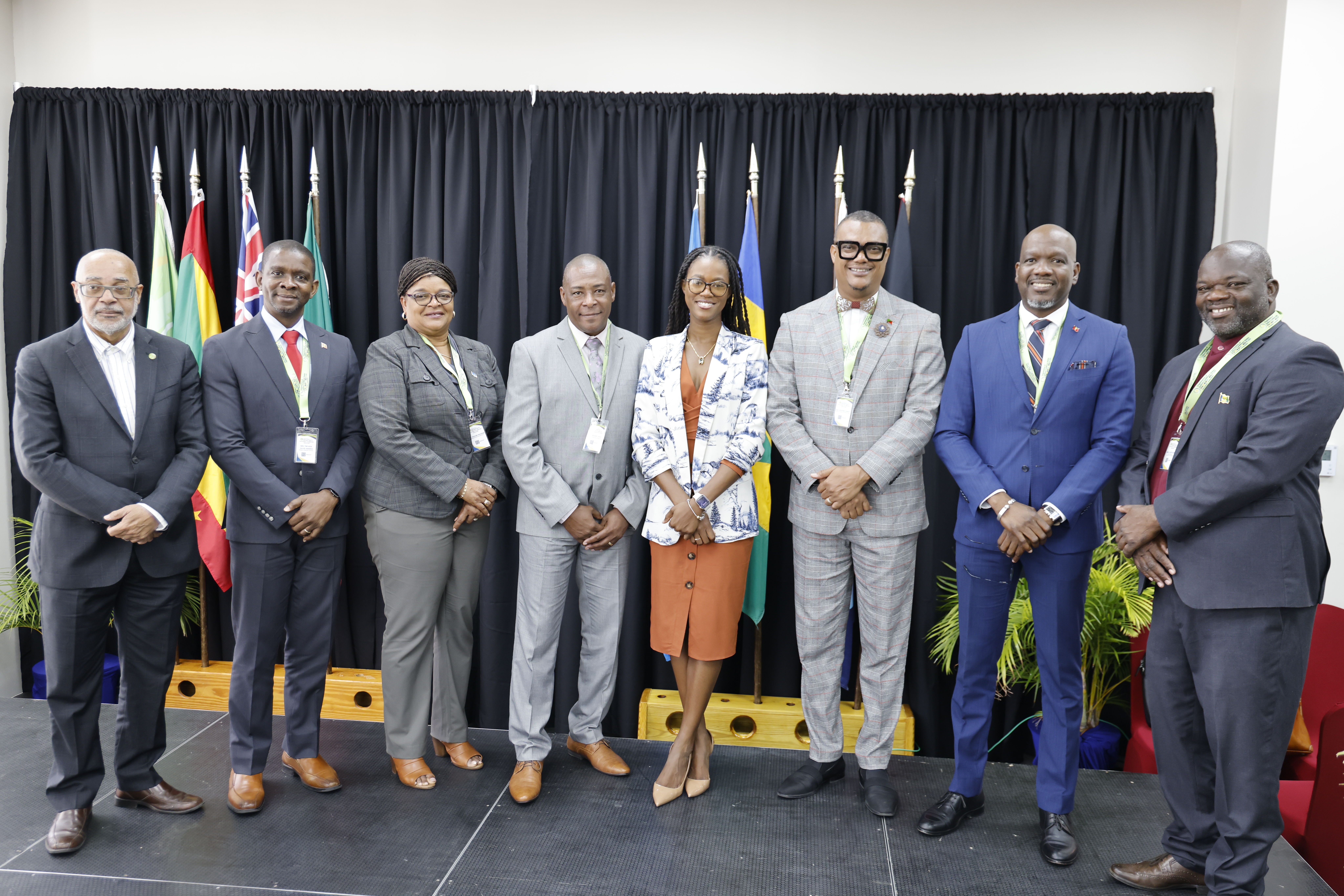The Eighth OECS Council of Ministers: Education focused on Data-Driven Development
OECS Media Release
The Eighth OECS Council of Ministers: Education (COM: Edu) was successfully hosted by Antigua and Barbuda under the Chairmanship of The Honourable Daryll Matthew, Minister of Education, Sport and Creative Industries. The two-day meeting was held on April 19-20, 2023 at the John E. St. Luce Finance and Conference Centre under the theme "Touching Lives through Data-Driven Development" via a hybrid approach of in-person and remote attendees. In attendance were Ministers of Education, Permanent Secretaries and Directors from Ministries of Education, as well as Education and Development Partners.
Announcing the outcomes of the two-day meeting, Hon. Daryll Matthew stated:
We had a tremendously robust exchange of thoughts and ideas. We had excellent dialogue and we addressed some key and critical issues that we believe affect our sub-region in the OECS.
Delivering remarks at the Opening Ceremony, His Excellency Dr. Didacus Jules, Director General of the OECS stated:
The OECS Ministers of Education have returned to the age-old question from Socrates and Dewey of "What is the purpose of education?” and have responded with a contemporary assertion: The transformation of education to serve as a primary instrument for revitalising Caribbean civilisation. This is expressed in our OECS Declaration on Education promulgated last year. The OECS Declaration on Education represents a major step in revolutionizing the OECS Education Sector by influencing the next iteration of the OECS Education Sector Strategy. This declaration makes a definitive statement on the purpose of education in the OECS, the actions that are required to address current threats but also make education relevant for the future and how it can be realized, which is ultimately through data-driven education reform. The theme of our conference "Touching Lives through Data-Driven Development" was intentional as the Commission seeks to influence decision-making grounded in reliable real-time, precise data.
The objective of the meeting was to provide policymakers with an opportunity to examine selected key education issues which are aligned with the OECS Education Sector Strategy (OESS). There were many nuanced discussions on the importance of data-driven development and education in the region. Several major themes also evolved out of the meeting such as the use of Artificial Intelligence (AI), poor performance regionally in Mathematics, the strengthening of partnerships and youth engagement at the highest level of decision-making.
Effective learning and student performance were areas of focus in the Curriculum and Assessment meeting segment. Working groups were established by the OECS Commission before the meeting and presentations were made on New Strategies / Approaches to Student Assessment, Teaching and Learning in the OECS; and the New OECS Harmonized Primary Curriculum.
As part of the OECS' continued prioritization of youth engagement, students from all levels were invited to contribute to the meeting. There was also a youth-led panel discussion entitled: Youth Speaks which highlighted the views of the youth on issues in dialogue, education, data, governance and development.
There were presentations on the OECS Child Online Protection Policy to ensure the safety of youth users in online spaces and the OECS Digital Learning Ecosystem which provides digital education training and free access to culturally relevant educational resources for the Early Grade Education Sector in the OECS.
Professional Development, the importance of Early Childhood Education to enhance student learning as well as the need to support Technical and Vocational Education Training in both traditional and emerging areas such as artificial intelligence, technology and robotics also featured in the meeting's high-level discussions. Delegates visited the Early Childhood Development Unit (ECDU) and the Harrison Centre Antigua and Barbuda Institute of Continuing Education (ABICE) to observe best practices in these areas and consider potential solutions to shared regional challenges.
The key decisions emanating from the two-day Council of Ministers: Education meeting were announced at a Press Briefing by The Honourable Darryl Matthew, Minister of Education, Antigua and Barbuda and Chair of the OECS Council of Ministers: Education. Member States:
-
Supported the adoption of the OECS Child Online Protection Policy and Strategic Framework document and the strengthening of advocacy around it.
-
Endorsed the OECS Digital Learning Ecosystem.
-
Endorsed the commitments on the policy paper on Curriculum and Assessment.
-
Agreed to engage the youth more meaningfully as active contributors in the decision-making process and agreed that part of the national delegation of the annual meeting would include a youth representative.
-
Suggested the strengthening of coordination of initiatives in the area of TVET and agreed to deepen cooperation with the EU Delegation in Barbados.
-
Agreed to mobilize resources from the Global Partnership of Education (GPE) to support implementation of the national and regional education strategies.
Editor’s Note
The COM: Edu meeting is typically a two-day face-to-face event that allows for engaging and intense discussions, with participation from Development Partners and other stakeholders.






